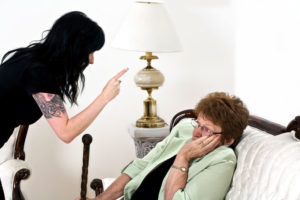
Learn how you can protect your loved ones from senior abuse.
Providing the assistance that helps seniors remain healthy, happy and independent is the objective of not only our professional senior care experts, but of each and every family caregiver who has ever assisted a loved one. Considering the health and happiness of older individuals is so important to us, it’s vital that we discuss something that can be tough for many of us to even consider – senior abuse.
The CDC reports that approximately 500,000 seniors are neglected or abused per year in the U.S. alone. Not only that, but many more elder abuse instances are presumed to go unreported each year, which is why it’s important for family members to be familiar with potential abuse risks.
Following are several of the risk factors identified with senior abuse:
- Dependence on others: Older individuals who are dependent on others for care are oftentimes reluctant to mention any abuse, as they may feel unsafe or that their care needs will not be able to be met by another individual if the abuser is reported.
- Reduced physical health and mobility: Alzheimer’s, dementia, or other health conditions may increase a senior’s danger of being abused as he or she may not be capable of conveying or verbalizing the abuse.
- History of abuse: If the senior was abusive as a parent, there is an enhanced likelihood for elder abuse, particularly if an adult child who was abused by the older person is the main caretaker.
- Social isolation: Social isolation typically occurs when a senior loses his or her spouse or lives in a distant location from friends and family, and it can lead to the perfect setting for elder abuse. Abusers frequently try to keep older adults isolated by:
- Refusing to obtain economic aid or services
- Resisting outside help
- Switching social and healthcare providers routinely to make it difficult to assess the older person’s health status
- Controlling contact with the older adult
- Family caregiver stress or burnout: Overloaded caregivers can become frustrated, causing them to lash out at the older individuals in their care.
If a loved one is being cared for by a family member or other caregiver, be aware of these risk factors, visit or call as often as possible to evaluate the senior’s health, and play an active role in the person’s care.
At Advanced Home Health Care, we know how important a senior loved one’s safety and health are, and we always take the appropriate measures to ensure we provide the highest level of home health care services. Each and every member of our senior care team has passed a thorough background check, reference checks, and a personal interview to ensure they meet our high caregiving requirements. Contact us today at 800.791.7785 to learn more about our in home care Burlington and the surrounding areas depend on.

